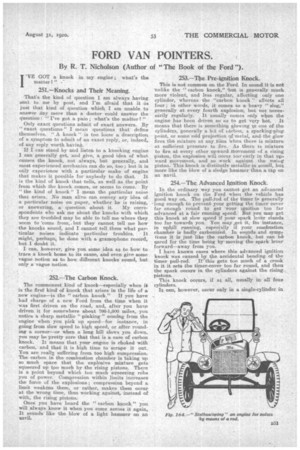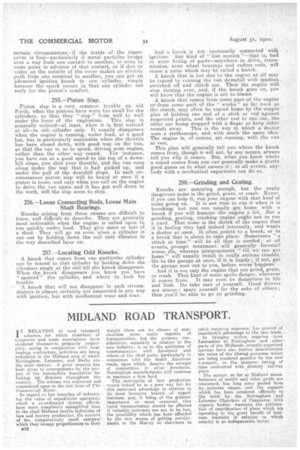FORD VAN POINTERS.
Page 25

Page 26

If you've noticed an error in this article please click here to report it so we can fix it.
By R. T. Nicholson (Author of "The Book of the Ford ").
I'VE GOT a knock in my engine; what's the matter? " :
251.—Knocks and Their Meaning.
That's the kind of question I am always having sent to rae by post, and I'm Sraid that it is iust that kind of question which, I am unable to answer any more than a doctor could answer the question: "I've got a pain; what's the matter?"
Only exact questions admit of exact answers. By "exact questions." I mean questions that define themselves. " A knock " is too loose a description of a symptom to admit of an exact reply, or, indeed, of any reply worth having. _ If I can stand by and listen to a knocking engine I can generally get, and give, a good idea of what causes the .knock, not always, but generally, and most experienced mechanics can do so, too; but it is only experience with a particular make of engine that makes it possible for anybody to do that. It is the kind of knock that tells, as well as the point from which the knock comes, or seems to come. By " the kind of knock" I mean the particular noise that arises. No man alive can convey any idea of a particular noise on paper, whether he is raising,
or answering, a question aboutit. My correspondents who ask rtfe about the knocks with which they are troubled may be able to tell me where they seem to 'come from,. but they cannot tell me how the knocks sound, and I cannot tell them what particular noises indicate particular troubles. It might, perhaps, be done with a gramophone record, but I doubt it.
I can, however, give you some idea aa to how to trace a knock home to its cause, and even give some vague notion as to how, different knocks sound, but only a vague notion. .
252.—The Carbon Knock.
The commonest ,kind of knock—especially when it is the first kind of knock that arises in the life of a new engine—is the carbon knock." If you have had charge of a new Ford from the time when it was first driven on the road, and, after you have driven it for somewhere about 7004,000 miles, you notice a sharp metallic " pinking" coming from the engine when you pick up speed—for instance, in going from slow speed to high speed, or after rounding a corner—or when a long hill slows you down, you may be pretty sure that that is a case of carbon knock. It means that your engine is choked with carbon, and that it is high time to scrape it out. You are really suffering from too high compression. The carbon in the combustion chamber is taking up so much space that the explosive mixture gets squeezed up too much by the rising pistons. There is a point beyond which too much sq-ueezing robs you of power. Compression within limits increases the force of the explosions; compression beyond a limit weakens them, or rather, makes them occur at the wrong time, thus working against, instead of with, the rising pistons.
Once you have heard the " carbon knock" you will always know it when you come across it again, It sounds like the blow of a light hammer on an
253.—The Pre-ignition Knock.
This is not common on the Ford. In sound it is not unlike the "carbon knock," but is generally much more violent, and less regular, affecting only one cylinder, whereas the "carbon knock " affects all four ; in other words, it comes as a heavy " slog," generally at every fourth explosion, but not neces
sarily regularly. It usually comes only when the engine has been driven so as to get -very hot. It means that there is something glowing n one of the cylinders, generally a bit of carbon, a sparking-plug 'point, or some odd projection a metal, and the glow fires the mixture at any time When there is mixture at sufficient pressure to fire. As there is mixture to fire at every other upward movement of a rising piston, the explosionwill occur too' early in that upi ward movement, and so work against the rising piston. This knock is distinctly metallic in soiled, but more like the blow of a sledge hammer than a tap on an anvil.
254.—The Advanced Ignition Knock.
In the ordinary way you cannot get an advanced ignition knock on the Ford when the vehicle has good way on. The pull-,kod of the timer is generally -long enough to prevent.your getting the timer cover far enough round to get your ignition too far advanced at a fair running speed. But you may get this knock at slow speed if your spark lever stands too far towards you. You may get it, ffn instance, in uphill running, especially if your combustion charnher is badly carbonized. In sounds and sympr tbms it is just like the carbon knock, but can•lad cured for the time being by' moving the spark lever forward—away from you.
have known cases where this advanced ignition knock was caused by the accidental bending of the timer pull-rod. It-this gets too much of a crook in it it sets the timer-cover too far round, and then the spark occurs in the cylinders against the rising pistons.
This knock occurs, if at all, usually in all four cylinders. It can, however, occur only in a single-cylinder in certain circumstances—if the inside of the timercover is foul—particularly if metal particles bridge over a way from one contact to another, or even to some point in advance of that contact, or if dirt or water on. the outside of the cover makes an electric . path from one terminal to another, you can get an advanced ignition knock in one cylinder, simply because the spark occurs in that one cylinder too early for the piston's comfort.
255.— Piston Slap.
Piston slap is a very common trouble on old Fords, when the pistons have woim too small for the cylinders, so that they " sla-p " from wall to wall under the force of the explosions. This slap is generally noticed—at least, when it is first noticed at all—in one cylinder only. It usually disappears when the engine is running, under load, at a good bat, but is particularly noticeable when the throttle has been closed down, with good way on the van, so that the van is, so to speak, driving your engine, rather than the other way 'round. For instance, you have run at a good speed to the top of a downhill slope, you shut your throttle, and the van runs along under the way that it. had picked up, and under the pull of the downhill slope. In such circumstances piston slap will be heard at once if a piston is loose, and only when you call on the engine to drive the van again and it has got well down to the work, will the slap seem to stop.
256.—Loose Connecting Rods, Loose Main Shaft Bearings.
Knocks arising from these causes are difficult to trace, and difficult to describe. They are generally most noticeable when the engine is called upon to run quickly under load. They give more or less of a thud. They will go on even when a cylinder is cutout by holding down the' coil unit vibrator in the way described later on.
257.—Locating Odd Knocks.
A knock that comes from one particular cylinder can be traced to that cylinder by holding down the vibrators singly at the coil till the knock disappears. When the knock disappears you know you have " spotted" the cylinder, and where to look for trouble.
A knock that will not disappear in such circumstances is almost certainly not connected in any way with ignition, but with mechanical wear and tear. And a knock is not necessarily connected with ignition. Any kind of "lost motion "—that is, bad or worn fitting of parts—anywhere in drive, transmission, even wheel bearings and radius rods, will cause a noise which may be called a. knock.
A knock that is not due to•the engine at all may be traced by running the van downhill with ignition switched off and clutch out. Thenthe engine will stop turning over, and, if the knock goes on, you will know that the engine is not to blame.
A knock that comes • from some part of the engine or from some pail of the " works" as far back as -the clutch, may often be traced home by the simple plan of holding one end of a _stiek or rod against suspected points, and the other end to one ear, the other ear being stopped with a finger to keep other sounds away. This is the way in which a doctor uses a stethoscope, and with much the same idea. The engine is, of course, set running, with the van at rest.
This plan will generally tell you where the knock comes frog!, though it will not, by any means, always tell you why it comes. But, when you know where a sound comes from you can generally make a pretty good guess as to whatcauses it ; at all events, anybody with a mechanical experience can do so.
258.--Grinding and Grating.
Knocks are annoying enough, but the really dangerous noise is the grind, grate, or crash. Never, if you can help it, run your engine with that .kind of noise going on. It is not wise to run it when it is knocking, but you can usually get home with a, knock if. you will humour the engine a bit. • But a grinding, grating, crashing engine ought not to run a yard. That noise is the shriek of the engine that it is feeling very bad indeed internally, and Wants a doctor at once. It often points to a break, or to a break that is about to take place. Sometimes stitch in time " will be all that is needed at all events, prompt treatment will generally forestall worse ills, whereas postponement "till we. can get home " will usually result in really serious trouble. Go to the garage at once, if it is handy ; if not, get the .garage man out to you, before worse happens. Audit is not only the engine that can grin& grate, or crash. That kind of noise spells danger, wherever it comes from. It may even be dangerous to life and limb. Do take care of yourself. Good "drivers are scarce spare yourself for the sake of others; then you'll be able to go on grinding.




























